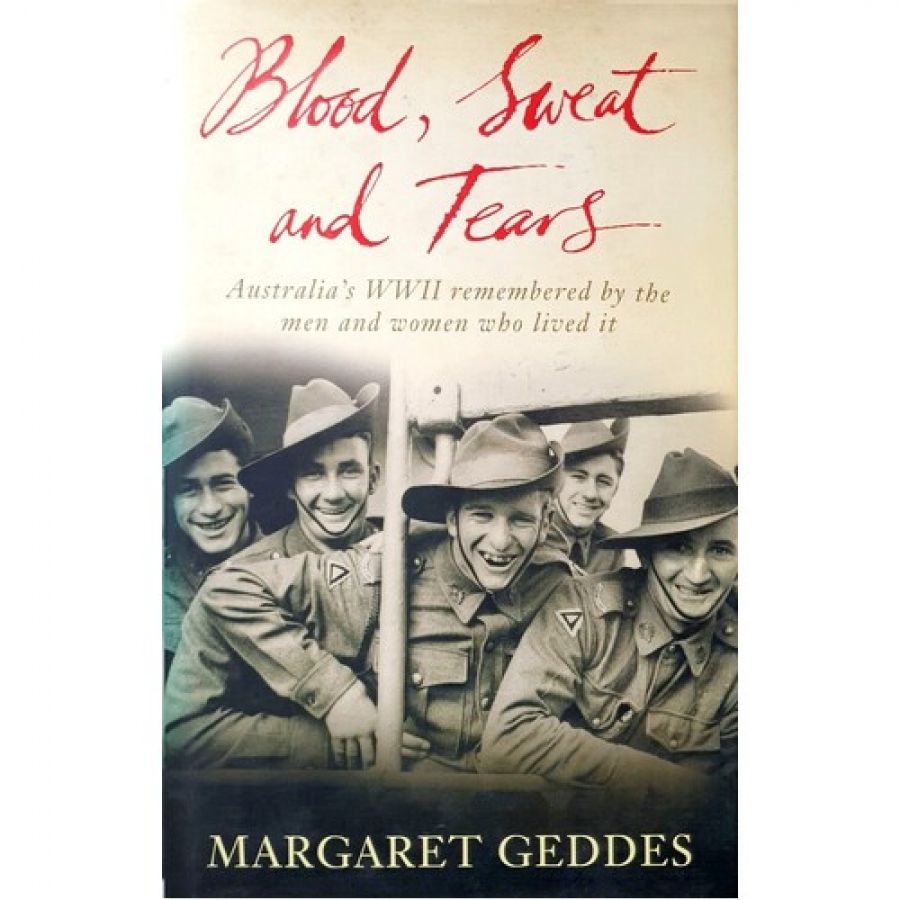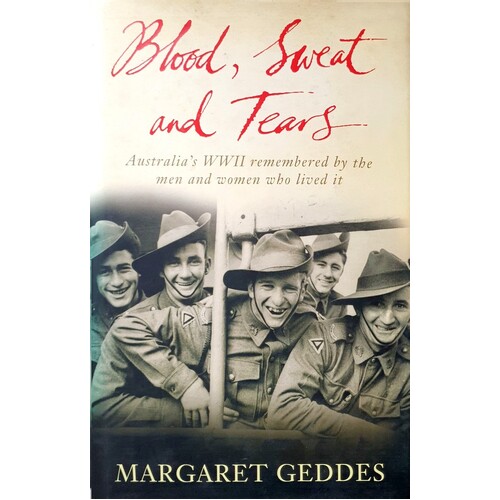
- Free Article: No
- Contents Category: Australian History
- Review Article: Yes
- Article Title: A rather rough war
- Online Only: No
- Custom Highlight Text:
In Margaret Geddes’s own words, Blood, Sweat and Tears ‘is a book of memories and feelings, not facts and dates’. As a result, she is able to avoid the structural, stylistic and other ramifications of historical and chronological accuracy. Instead, she is interested more in the quality and reverberations of their recollections and their reconstruction of events that are ‘with them still’, and is able to give her various interlocutors full narrative rein to hit upon their own rhythms, pursue their own lines of emphasis and obsession, and often talk at considerable length.
- Book 1 Title: Blood, Sweat and Tears
- Book 1 Subtitle: Australia’s WWII remembered by the men and women who lived it
- Book 1 Biblio: Viking, $49.95 hb, 505 pp
- Book 1 Cover Small (400 x 600):

- Book 1 Cover (800 x 1200):

The interview book – in which a relatively knowing, but politely curt, questioning voice engages people who are of interest because they are famous, talented, members of a particular grouping, social class or tendency, or in other ways intriguing – had a vigorous run some twenty years ago. Yacker, Men on Women, Women on Men, Late Life Fathers, TallPoppies, Sideways from the Page were only a few examples of what became briefly a sort of sub-genre. Many compilers of interview books were no doubt influenced, some directly and deliberately, others more obliquely, by Studs Terkel’s Division Street America (1967), Hard Times (1970) and Working (1974), in which Terkel interviewed a range of people about living in Chicago, coping with the Depression, and the nature of work, respectively. These were immensely influential books, and their method – the almost anonymous questioning voice eliciting often raw, unguarded vernacular responses – was new and exciting. By the time he won the Pulitzer Prize in 1985 (for The Good War), Terkel’s method – being a ‘guerilla journalist with a tape recorder’ – had attracted many imitators.
Geddes, whether consciously or not, is very much in the Terkel line. Existing in the various accounts as merely a questioning voice – ‘How long did it take you to recover physically?’, ‘How many patients could you take?’, ‘Did working hours increase?’ – Geddes becomes the conduit for a mass of recollections that are rarely less than interesting but are often utterly riveting, sometimes horrifying, sometimes inspiring immense admiration and awe. Some of the anecdotes that accumulate are flawed no doubt by faulty memory; some narrators are articulate and dramatic, others halting and digressive; the educated and self-aware undercut their experiences with irony or modestly understate them; others, in telling their personal stories, find a renewed intensity as reliving events rekindles old passions.
‘Well, I tightly grabbed the stick over the pilot’s slumped body,’ recalls Graeme McCabe, who found himself trying to match Japanese Zero fighters with ancient, slow and cumbrous Vildebeests, ‘got [the plane] turned around and flew us out to get away from [the Japanese fighters]. But we careened slowly and slowly down towards the sea. I’m saying a prayer, you know, commending my spirit (laughs) to the Almighty, when bang! we hit the water. Seemed to go down for a tremendous depth, then I came to the surface and there was the rubber dinghy floating on top, so I climbed up into that. I didn’t stay there long. They had a flaw in them, the dinghies in the Vildebeest, and it was a leak. Anyway, the Japanese fighter pilots were flying over, systematically shooting the canopies out of descending parachutists, so the poor fellows that had bailed out … that made me feel, “This is going to be a rather rough war”.’
Victoria Cross winner Ted Kenna is so unwilling to big note his own remarkable bravery that the questioning voice has to be a little more insistent and directing than usual:
Oh that [the action for which he won the Victoria Cross] was a bit strange too … [the Japanese] opened up on us from everywhere it seemed to me, and we went to the ground. Where we were, there seemed to be a hell of a lot of them. Trying to engage them from our sector, you couldn’t fire a rifle or a Bren because the hill was interfering with it, and you had to do, actually, what I did. I stood up and fired and I got somewhere with that. Anyhow, we killed a couple.
Were you using your Bren gun?
Oh yeah, I fired a few shots at ‘em.
Did you ask for a rifle?
I called for a rifle. As I said, me company went down, me battalion went down. I were given a rifle and me section went down … I was pretty lucky with a few shots with the rifle and got the joker with the machine gun all right. When I went up a bit further, the joker on my extreme left up on the hill, he opened up and I put a few shots there and that was it.
There are any number of marvellous stories and a reasonable measure of differentiation in the narrating voices. But in the end, the book becomes a repository rather than the (necessarily fragmented) narrative it might have been. Precisely because the material is unmediated, simply endlessly produced for our interest or admiration or amazement in response to artless questioning, it loses its drive and punch, notwithstanding the intrinsically important and interesting nature of the material. This is a pity, though no doubt unavoidable: it is in the nature of the ‘interview book’ as it evolved, and was probably an important cause of its falling from favour.


Comments powered by CComment